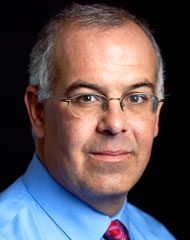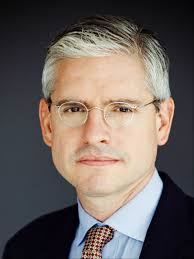Young people often make the transition from Democrat to Republican as they mature. Ronald Reagan was once a Democrat. But in my mind, once a liberal, always a liberal.
Liberals will defend their ideology to the hilt, but they don’t like to be called “liberal,” preferring “progressive.” In a January 2014 Gallup poll, just 23 percent admitted to be liberal.
During her 2008 presidential run Hillary Clinton said, “I prefer the word ‘progressive’ … I consider myself a proud modern American progressive.” She claimed that over the years the definition of a liberal “has been turned up on its head and it’s been made to seem as a though it is a word that describes big government.” Bingo!
I’d like to tell you about two “Davids” – David Brooks and David Brock, both use the word “conservative” loosely. Very loosely.

New York Times columnist David Brooks is billed as a conservative columnist. (Josh Haner photo/New York Times)
David Brooks is billed as a conservative columnist at the liberal New York Times. He has admitted being a liberal Democrat when he was young. The New Republic, a liberal publication, published a piece on Brooks’ meeting with then Senator Barack Obama. It was called, “The Courtship,” because it led to Brooks’ column, “Run, Barack, Run.”
“I don’t want to sound like I’m bragging, “ Brooks told New Republic writer Gabriel Sherman, “but usually when I talk to senators, while they may know a policy area better than me, they generally don’t know political philosophy better than me. I got the sense he (Obama) knew both better than me.”
Brooks recalled a vivid memory of that encounter during the interview. “I was looking at his pant leg and his perfectly creased pant, and I’m thinking, a.) he’s going to be president and b.) he’ll be a very good president.” Now that’s what I call deep thinking.
Obama certainly considered Brooks a liberal. When conservative columnist George Will hosted a dinner for Obama at his home during the 2008 campaign, he invited several conservative friends, including Charles Krauthammer, Larry Kudlow, Paul Gigot and David Brooks. When the president shook hands with Brooks he said, “What are you doing here?”
Once Obama was in office, Brooks considered “ninety-five percent of the decisions they (the administration) make are good and intelligent.” To which, Sherman wrote that Brooks, “prominent conservative, has become the most visible journalistic ally of arguably the most liberal president of his time.”
After Hillary Clinton’s reference to Obama’s “don’t do stupid stuff” foreign policy, Brooks could only say the pair represent “different Democratic differences.”

David Brock. who considers himself a conservative Democrat now heads up Media Matters, an organization with a mission of attacking conservative “misinformation.” (otherwords.org)
David Brock’s transformation has been via a more circuitous route. The giveaway should have been his graduation from the University of California at Berkeley. He joined the staff of the weekly conservative Insight on the News sister publication to The Washington Times. After a stint as a research fellow at the right-leaning Heritage Foundation, The American Spectator published his critical story about Clarence Thomas’s accuser, Anita Hill, which he later turned into a best-selling book.
In 1994 the Spectator ran his story about Bill Clinton’s Arkansas escapades, winning an award from the Western Journalism Center. Several years later he wrote, “The Seduction of Hillary Rodham,” a positive biography that caught conservatives off guard.
In July 1997 he recanted much of what he wrote for the Spectator in a piece he wrote for Esquire magazine called, “Confessions of a Right-Wing Hit Man.” He now calls himself a conservative Democrat.
In 2004 he founded Media Matters for America, said to be a non-profit organization that does progressive research dedicated to comprehensively monitor, analyze and correct conservative misinformation in the U.S. media. Leftist billionaire George Soros has provided funding for the organization.
Most recently, Media Matters has been doing hit pieces on what they call former CBS reporter Sharyl Attkisson’s “shoddy reporting” on Obama administration scandals.
Regarding my Aug. 20, 2014 post, “Is the media turning on Obama,” don’t look for either David to turn on Obama.





